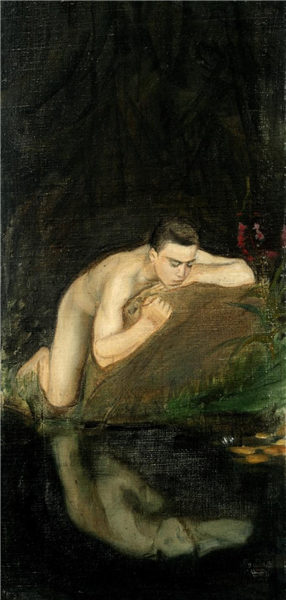Just another WordPress.com weblog
Month: June, 2021
__________
Still o’er the fountain’s wat’ry gleam he stood,
Mindless of sleep, and negligent of food;
Still view’d his face, and languish’d as he view’d.
Narcissus has been smitten by this
reflection of himself in the fountain’s
wat’ry gleam, can’t sleep, won’t eat
note, incidentally, the two meanings
of Still here, the first, without moving,
the second, not having stopped, not
discontinued
At length he rais’d his head, and thus began
To vent his griefs, and tell the woods his pain.
“You trees,” says he, “and thou surrounding grove,
Who oft have been the kindly scenes of love,
Tell me, if e’er within your shades did lye
A youth so tortur’d, so perplex’d as I?
I, who before me see the charming fair,
the charming fair, his reflection
in the fountain’s wat’ry gleam
Whilst there he stands, and yet he stands not there:
In such a maze of love my thoughts are lost:
Narcissus reflects, bewildered
by the ephemerality of his
vision
And yet no bulwark’d town, nor distant coast
Preserves the beauteous youth from being seen,
No mountains rise, nor oceans flow between.
there is no material object, he reasons,
to obstruct a clear view of the beauteous
youth before him, no intervening
obstacles between him and his vision
bulwark’d, defended with fortifications,
as in Medieval towns
the beauteous youth, his own reflection
A shallow water hinders my embrace;
A shallow water, only a sheen is
required to cast a reflection, a
film merely, the water need not
be at all that deep
And yet the lovely mimick wears a face
the lovely mimick, the image in
the water
That kindly smiles, and when I bend to join
My lips to his, he fondly bends to mine.
what of homosexuality here, an
unobjectionable predilection at
the time, apparently, there isn’t
a whiff of iniquity in this attraction,
according to the text, no hint of
guilt or embarrassment
Hear, gentle youth, and pity my complaint,
a direct exhortation here, note,
no longer, in this instance, a
literary narration, a tale being
told
Come from thy well, thou fair inhabitant.
My charms an easy conquest have obtain’d
O’er other hearts, by thee alone disdain’d.
you, Narcissus says, alone, replication,
disdain[ ], repulse, my advances, my
elsewhere, otherwise, easy conquest[s]
But why should I despair? I’m sure he burns
With equal flames, and languishes by turns.
When-e’er I stoop, he offers at a kiss,
offers, responds with
And when my arms I stretch, he stretches his.
His eye with pleasure on my face he keeps,
He smiles my smiles, and when I weep he weeps.
When e’er I speak, his moving lips appear
To utter something, which I cannot hear.
all his senses are alive, but for
his hearing, which registers only
silence, when all of the other
aspects of the experience are
precise and vivid as though
real, utterly, however
incompatibly, convincing
“Ah wretched me! I now begin too late
To find out all the long-perplex’d deceit;
It is my self I love, my self I see;
The gay delusion is a part of me.
I kindle up the fires by which I burn,
And my own beauties from the well return.
Whom should I court? how utter my complaint?
court, sue to, argue, put to the
test a dilemma, a complaint, as
though before an arbiter
Enjoyment but produces my restraint,
And too much plenty makes me die for want.
How gladly would I from my self remove!
And at a distance set the thing I love.
My breast is warm’d with such unusual fire,
I wish him absent whom I most desire.
And now I faint with grief; my fate draws nigh;
In all the pride of blooming youth I die.
the contradictions inherent in passion
are evidenced, in this case those of
love
Death will the sorrows of my heart relieve.
Oh might the visionary youth survive,
visionary, relating to vision, observed,
caught sight of, viewed, in the water
relieve, render solace to, there is no
solution to this anguished misery
but dying
I should with joy my latest breath resign!
But oh! I see his fate involv’d in mine.”
you might have noted, or not, that
the tale has become psychological
in the instance of Narcissus, where
earlier an action transpired and
events were recounted in
chronological order, in this myth,
the subject explores his inner
world while sitting quietly
throughout by the still water,
nothing moves, but the
palpitations of his heart, and its
distempers
there’s a shift here in not only
the mythological template, more
personal, individual stuff, but also
in the very evolution of literature,
which takes on a more interior
tone rather than fatalistic,
episodic, given entirely to
unfathomed circumstance
eventually, the anthem that took
over the subsequent centuries
introspection, setting the stage
for the ensuing ages of
individualism, human rights
but that’s another story
stay tuned
R ! chard

